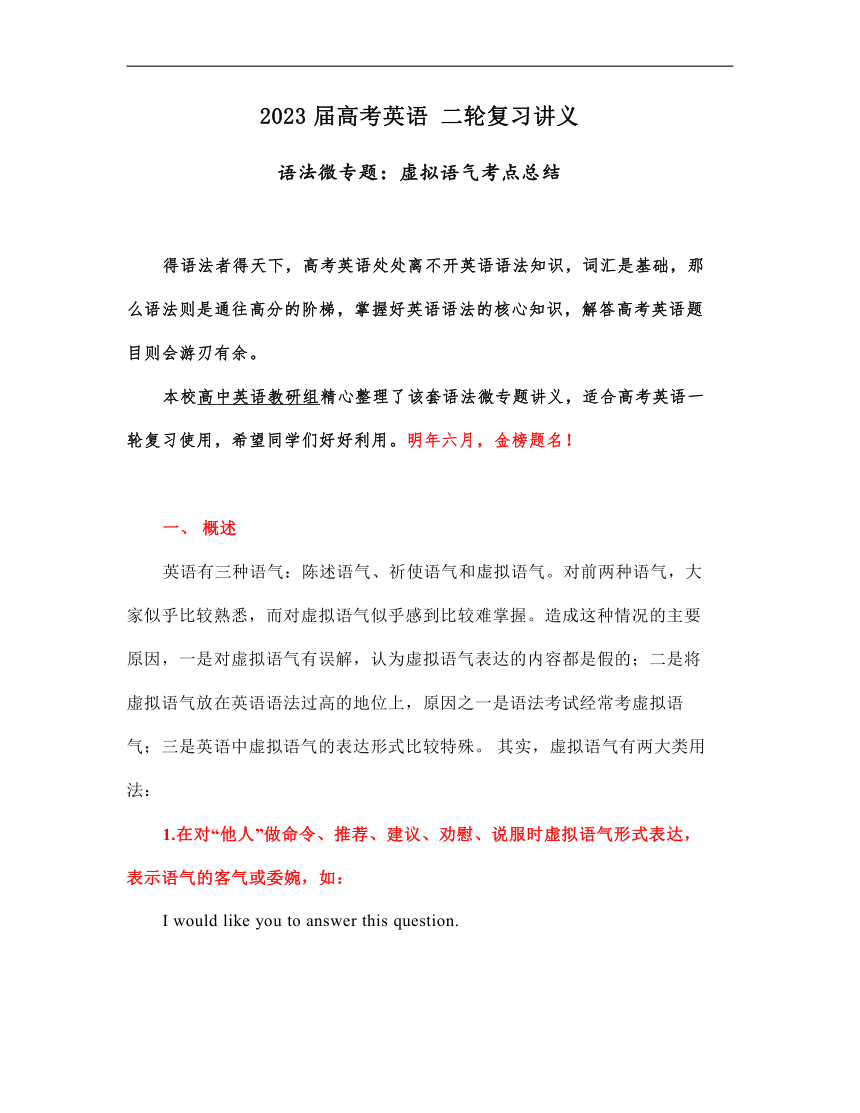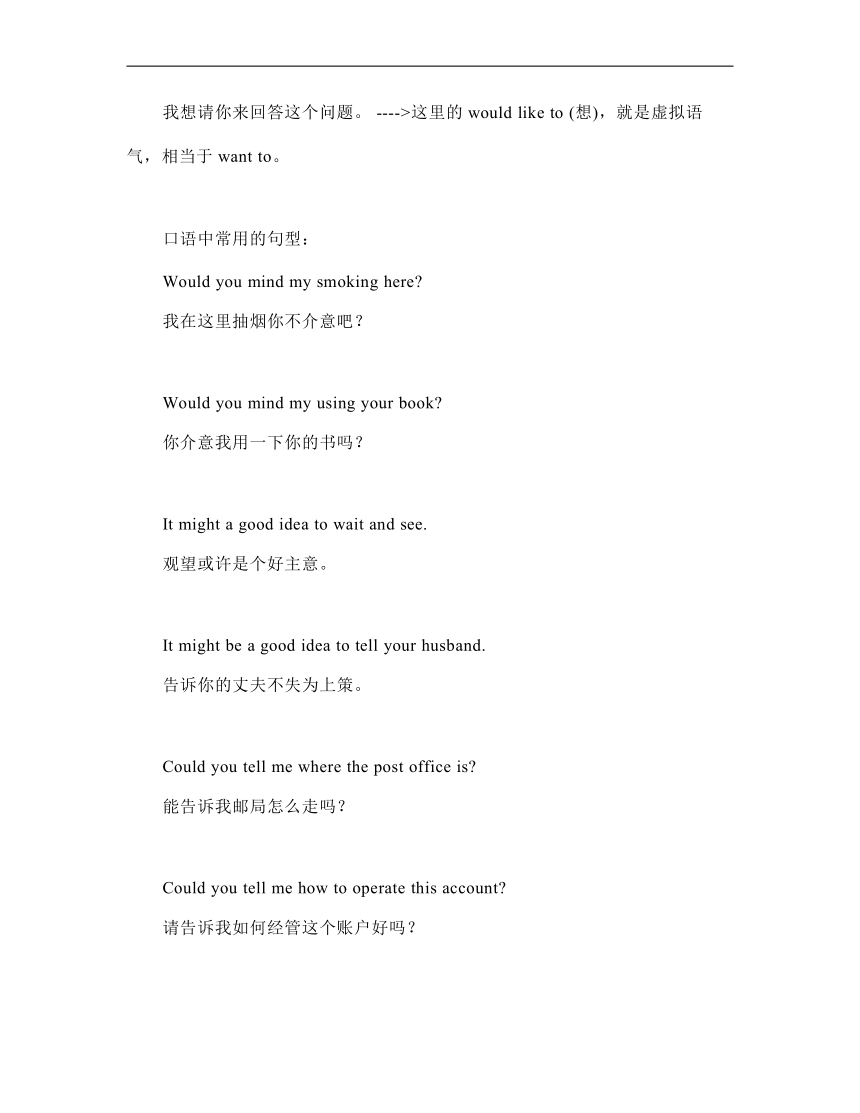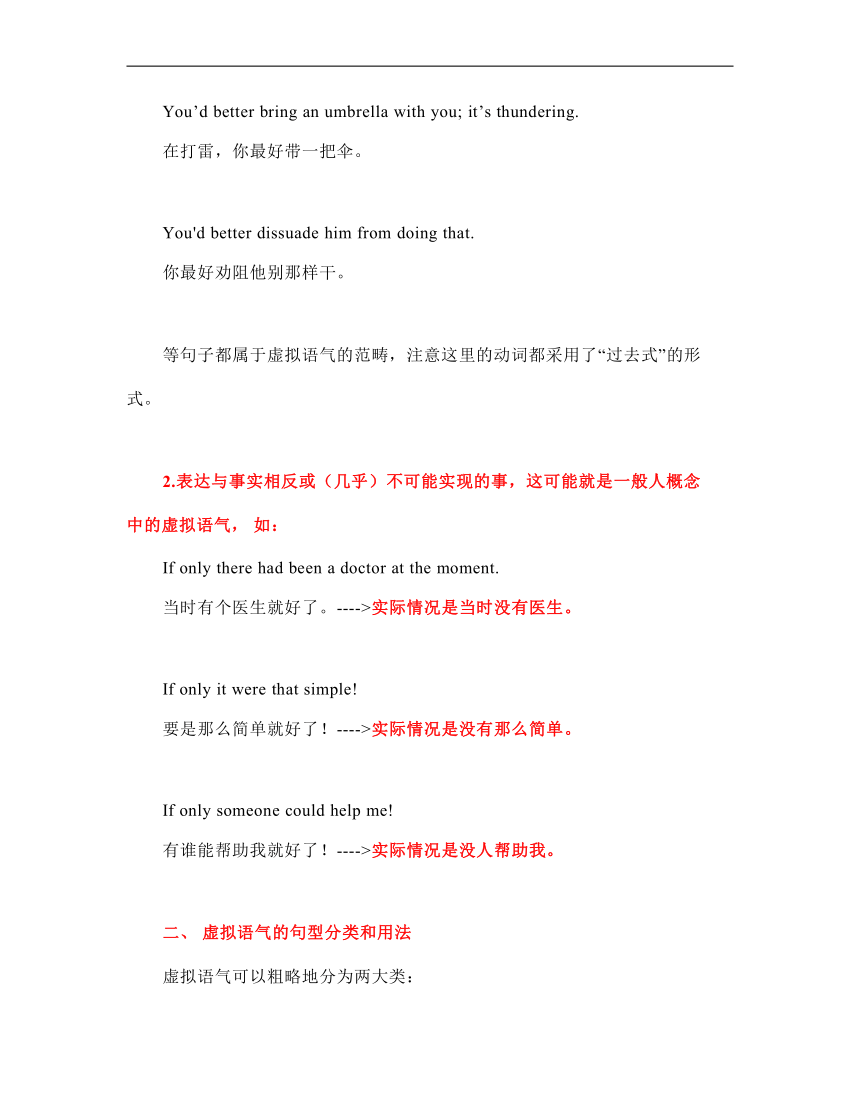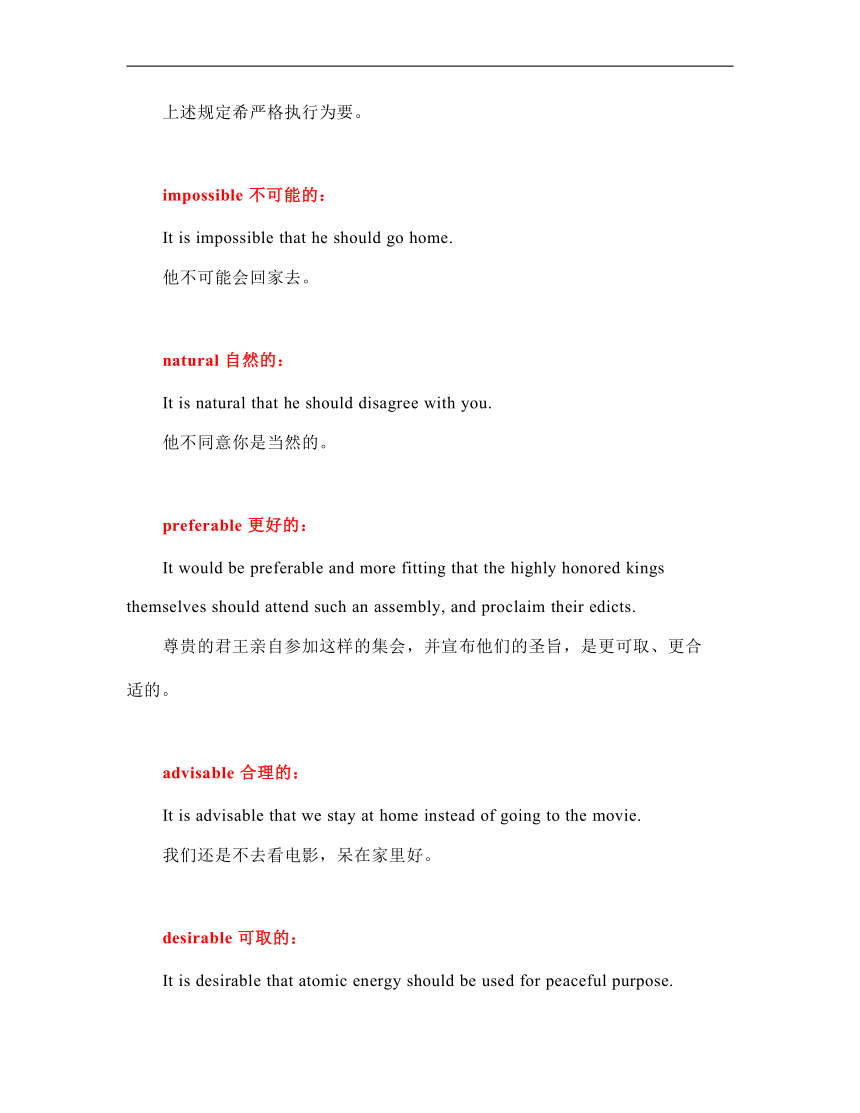2023届高考英语二轮复习语法微专题:虚拟语气考点总结讲义(含答案)
文档属性
| 名称 | 2023届高考英语二轮复习语法微专题:虚拟语气考点总结讲义(含答案) |

|
|
| 格式 | docx | ||
| 文件大小 | 27.0KB | ||
| 资源类型 | 教案 | ||
| 版本资源 | 人教版(2019) | ||
| 科目 | 英语 | ||
| 更新时间 | 2022-09-27 07:41:00 | ||
图片预览





文档简介
2023届高考英语 二轮复习讲义
语法微专题:虚拟语气考点总结
得语法者得天下,高考英语处处离不开英语语法知识,词汇是基础,那么语法则是通往高分的阶梯,掌握好英语语法的核心知识,解答高考英语题目则会游刃有余。
本校高中英语教研组精心整理了该套语法微专题讲义,适合高考英语一轮复习使用,希望同学们好好利用。明年六月,金榜题名!
一、 概述
英语有三种语气:陈述语气、祈使语气和虚拟语气。对前两种语气,大家似乎比较熟悉,而对虚拟语气似乎感到比较难掌握。造成这种情况的主要原因,一是对虚拟语气有误解,认为虚拟语气表达的内容都是假的;二是将虚拟语气放在英语语法过高的地位上,原因之一是语法考试经常考虚拟语气;三是英语中虚拟语气的表达形式比较特殊。 其实,虚拟语气有两大类用法:
1.在对“他人”做命令、推荐、建议、劝慰、说服时虚拟语气形式表达,表示语气的客气或委婉,如:
I would like you to answer this question.
我想请你来回答这个问题。 ---->这里的would like to (想),就是虚拟语气,相当于want to。
口语中常用的句型:
Would you mind my smoking here
我在这里抽烟你不介意吧?
Would you mind my using your book
你介意我用一下你的书吗?
It might a good idea to wait and see.
观望或许是个好主意。
It might be a good idea to tell your husband.
告诉你的丈夫不失为上策。
Could you tell me where the post office is
能告诉我邮局怎么走吗?
Could you tell me how to operate this account
请告诉我如何经管这个账户好吗?
You’d better bring an umbrella with you; it’s thundering.
在打雷,你最好带一把伞。
You'd better dissuade him from doing that.
你最好劝阻他别那样干。
等句子都属于虚拟语气的范畴,注意这里的动词都采用了“过去式”的形式。
2.表达与事实相反或(几乎)不可能实现的事,这可能就是一般人概念中的虚拟语气, 如:
If only there had been a doctor at the moment.
当时有个医生就好了。---->实际情况是当时没有医生。
If only it were that simple!
要是那么简单就好了!---->实际情况是没有那么简单。
If only someone could help me!
有谁能帮助我就好了!---->实际情况是没人帮助我。
二、 虚拟语气的句型分类和用法
虚拟语气可以粗略地分为两大类:
第一类:should型虚拟式
第二类:were型虚拟式
1.should型虚拟式:should+原形动词(往往会省去should,特别是在考试时) 这类虚拟式最多用在以下词或句型中:
(1)
It is necessary that…..的主语从句中,如:
It is necessary that chief should be present personally at the meeting.
主任有必要亲自参加这次会议。
只要看到“necessary”,马上要想到这是“should型”虚拟式。
记住下面构成“should型”虚拟式的词:
essential 必要的:
It is essential that you have some experience.
你必须得有些经验。
important 重要的:
It is important that we put Jesus into the context of history.
我们将耶稣置于历史环境中来看是很重要的。
imperative 迫切的:
It is imperative that the above rules be strictly observed.
上述规定希严格执行为要。
impossible 不可能的:
It is impossible that he should go home.
他不可能会回家去。
natural 自然的:
It is natural that he should disagree with you.
他不同意你是当然的。
preferable 更好的:
It would be preferable and more fitting that the highly honored kings themselves should attend such an assembly, and proclaim their edicts.
尊贵的君王亲自参加这样的集会,并宣布他们的圣旨,是更可取、更合适的。
advisable 合理的:
It is advisable that we stay at home instead of going to the movie.
我们还是不去看电影,呆在家里好。
desirable 可取的:
It is desirable that atomic energy should be used for peaceful purpose.
原子能应该为了和平的目的而使用,这是合乎情理的。
urgent 紧迫的:
It is urgent that government and experts take measures to solve these problems.
迫切需要政府和专家采取措施解决这些问题。
incredible 难以想象的:
It is incredible that some people should still believe in witchcraft in this day and age.
难以令人置信的是,有些人至今还相信巫术。
(2)
order 命令、recommend 推荐、suggest 建议、demand 要求、command 命令、propose 建议、require 要求、request 请求、insist 坚持认为、urge 主张、advise 劝告、ask 要求、prefer 宁愿、move 提议、vote 提议
由这些词构成的宾语从句,主语从句、表语从句、同位语从句或其他有关句型时,都要使用“should型”虚拟式:
order命令:
It was ordered that the medicines (should) be sent there by plane at once.---->主语从句
The order was that the medicines (should) be sent there by plane at once. ---->表语从句
The chief ordered that the medicines (should) be sent there by plane at once. ---->宾语从句
The order that the medicines (should) be sent there by plane at once was sent to the branch office. ---->同位语从句
recommend 推荐:
It is recommended that you should consult your doctor
建议你去咨询医生。
suggest 建议:
It is suggested that we should limit the amount of cars and bicycles to improve our environment.
为了改进我们的环境,有人建议我们应该限制小车和自行车的数量。
demand 要求:
We demand that the meeting should be postponed.
我们要求会议延期召开。
command 命令:
The teacher commanded that I should go out of the classroom at once.
老师命令我立刻离开教室。
propose 建议:
She proposed that the book be banned.
她提议查禁这本书。
require 要求:
The situation required that he be present.
这种情形需要他在场。
request 请求:
She requested that no one be told of her decision until the next meeting.
她要求下次开会前不要向任何人透露她的决定。
insist 坚持认为:
He insists that she come.
他执意要她来。
urge 主张:
The report urged that all children be taught to swim.
这份报告呼吁给所有的儿童教授游泳。
advise 劝告:
They advise that a passport be carried with you at all times.
他们建议护照要随时带在身边。
ask 要求:
She asked that she be kept informed of developments.
她要求继续向她报告事态发展情况。
prefer 宁愿:
We prefer that each new student take a science course.
我们宁愿每位新生修一门理科课程。
move 提议:
I move that a vote be taken on this.
我提议就此进行投票。
vote 提议:
I vote (that) we go out to eat.
我提议我们到外面去吃饭。
(3)在in case / lest=for fear that(以免。。。。/以防。。。)结构中,例如:
in case:
In case I forget, please remind me of my promise.
假如我忘记了,请提醒一下我的诺言。
lest:
He gripped his brother's arm lest he be trampled by the mob.
他紧抓着他兄弟的胳膊,怕他让暴民踩着。
for fear that:
He was very cautious for fear that he should be blamed for anything wrong.
他处处小心,就怕落下不是。
2、were型虚拟式
所谓were型虚拟式,就是借用行为动词过去时的某个形势以及be动词的"were"这个词来表达某种虚拟的语气。 由于were型虚拟式主要用在if非真实条件句中,而且它是其他were型虚拟式句型的基础,所以我们先要搞清楚if非真实条件句。
(1)if非真实条件句:
条件句分为真实条件句和非真实条件句:
真实条件句是指真的或可以实现的条件句,例如:
If we work together, we are sure to finish the task in time.
如果我们大家一起努力,就一定能按时完成任务。
动词使用的是真实的时态和形式。
非真实条件句是指对已经发生过的事情,或对不可能发生或实现的事进行假设,例如:
“如果当时有医生在,这个孩子就又可能得救了”,显然,这是对已发生的事情的一种假设,该句的英语表达为:
If there had been a doctor available, the child might have been saved.
为了便于理解和记忆,我们用表格形式加以归纳:
时间 动词形式 举例
过去 If 条件句:had done/ had been 结果句:would/could/might/should have done/been If there had been a doctor available, the child might have been saved. 倒装:Had there been a doctor available, the child might have been saved
现在 If条件句:did / be 动词用were 结果句:would do (be) If I were you, I would accept his offer. (如果我是你的话,我就接 受他的提议。) 倒装:Were I you, I would accept his offer. If I knew the face, I would tell you. (我要是知道,我就会告诉你) 不可以倒装
将来 If条件句:should do (be)/were to 结果句: (be) If it should rain tomorrow, we would stay at home. (一旦明天下雨,我们就呆在家里。) 倒装:Should it rain tomorrow, we would stay at home. If he were to come this evening, I would ask him to help solve the problem. (要是他晚上回来,我就请他帮助解决这个问题。) 倒装:Were he to come this evening, I would ask him to help solve the problem.
这里关键是要掌握好两点:
1.虚拟行为或状态发生的时间:过去?现在?还是将来?
2.采用了什么相应的动词形式?
补充说明:
1.当“if”省略后,要采用倒装形式,如举例所示。
2.如果所说的条件是永远不可逆转的。如“如果我是你的话”(我永远不可能变为你),即使是对过去的假设,也用“现在”虚拟式表示,例如:
If I were you, I would have taken his advice.
要是换了我,我就采纳他的意见了。
3.结果句中的would 可以根据内容需要,使用might, could 或 should, 例如:
If she had known that you were there, she might have come.
要是她知道你在哪儿,她或许会来的。
但是“将来”虚拟式条件句中的should 是将来时的“标志词”,不能用would代替,不要搞错了。
4.关于含蓄虚拟式:含蓄虚拟式是指虚拟的条件用一种比较含蓄的方式加以表达的虚拟语气,如:
“我昨天很忙,要不就来参加你的生日派对了”。其中的“我很忙”是真实情况,“要不就来参加你的生日派对了”则是虚拟的:
I was very busy yesterday, or I would have come to your birthday party.
所以,注意句子中出现的:
but, or (否则)
otherwise (否则)
without (要不是)
with (要是有)
but that (要不是),
but for (要不是)
if it were not for /过去:if it had not been for (要不是)等用来引出含蓄虚拟式的词或短语。
but:
He would put on weight, but he doesn't eat much.
他会发胖的,然而他没有吃太多。
or:
He must have thought Jane was worth it or he wouldn't have wasted time on her, I suppose.
我想,他一定认为简值得他这么做,否则他不会在她身上浪费时间。
otherwise:
My parents lent me the money. Otherwise, I couldn't have afforded the trip.
我父母借钱给我了。否则,我可付不起这次旅费。
without:
Without wanting to criticize, I think you could have done better.
我不是想要批评谁,只是认为你本可以做得更好一些。
with:
With better equipment, we could have finished the job even sooner.
要是设备好些,我们完成这项任务还有快些。
but that:
I would have failed but that you helped me.
要不是你们帮助我,我就会失败。
but for:
But for (或without) you cooperation, we would not have completed the experiment so smoothly.
要不是你们和合作,我们不可能那样顺利地完成这个实验。
if it were not for:
If it were not for the liberation, my whole family would have been ruined.
如果不是解放,我早已家破人亡了。
if it had not been for:
If it had not been for your timely help, I would have failed.
如果当时没有你及时的帮助,我会失败的。
(2)were型虚拟式的其他用法(同样要遵守“过去、现在、将来”的细腻规则):
wish宾语从句:
I wish that he had not made so much fuss about it.
真希望他不要把那事情搞大了。---->过去
I wish that I were a doctor.
我希望我是个医生就好了。---->现在 (注:这个句型中也可以用I wish that I was a doctor.)
I wish that the rain would stop.
真希望雨能停下来。---->将来
If only…… (要是。。。就好了)
If only you hadn’t offended him.
你当时不惹他就好了。---->过去
If only I had some money on hand now.
我现在手头有些钱就好了。---->现在
If only he could come tomorrow.
他明天能来有多好啊。---->将来
It is (about / high) time that …..(是。。。的时候了)
由于该句型只能用在“现在”时间,所以从句的动词只能是“过去时”形式,例如:
It is high time (that) we began to work.
咱们该开始工作了。
It is high time the Government displayed a more humanitarian approach towards victims of the recession
政府早该对受到经济衰退影响的人们采取更加人性化的救助措施。
As if (though) ….(似乎。。。)
这个句型可以是陈述语气,也可以是虚拟语气。虚拟语气的时态变化原则与“wish”用法相同,例如:
She loves the children in the kindergarten as if they were her own.
她像自己孩子一样热爱幼儿园的孩子们。---->现在
He talked about China as if he had been there.
他谈起中国来好象去过那里。
It looks as if it is going to rain.
看来天要下雨。---->陈述语气
Would (had) rather, would just as soon, would sooner, would prefer + 从句结构 这几个句型都表示一种“委婉的责备”,中文常有“还不如。。。”,“宁可。。。”“倒希望。。。”等意思,例如:
I’d rather she stayed at home in such a bad health condition.
她身体这么差,我倒希望你待在家里。---->现在
I would just as soon you had returned him the money yesterday.
你还不如昨天就把钱还给他了。---->过去
I would prefer he didn’t stay there too long.
我倒不希望他不要在那儿待得时间太长。
比较:
I would prefer that she act the young lady.
我倒认为她演的那个年轻女子比较合适。表示建议,用“should型虚拟式”。
语法微专题:虚拟语气考点总结
得语法者得天下,高考英语处处离不开英语语法知识,词汇是基础,那么语法则是通往高分的阶梯,掌握好英语语法的核心知识,解答高考英语题目则会游刃有余。
本校高中英语教研组精心整理了该套语法微专题讲义,适合高考英语一轮复习使用,希望同学们好好利用。明年六月,金榜题名!
一、 概述
英语有三种语气:陈述语气、祈使语气和虚拟语气。对前两种语气,大家似乎比较熟悉,而对虚拟语气似乎感到比较难掌握。造成这种情况的主要原因,一是对虚拟语气有误解,认为虚拟语气表达的内容都是假的;二是将虚拟语气放在英语语法过高的地位上,原因之一是语法考试经常考虚拟语气;三是英语中虚拟语气的表达形式比较特殊。 其实,虚拟语气有两大类用法:
1.在对“他人”做命令、推荐、建议、劝慰、说服时虚拟语气形式表达,表示语气的客气或委婉,如:
I would like you to answer this question.
我想请你来回答这个问题。 ---->这里的would like to (想),就是虚拟语气,相当于want to。
口语中常用的句型:
Would you mind my smoking here
我在这里抽烟你不介意吧?
Would you mind my using your book
你介意我用一下你的书吗?
It might a good idea to wait and see.
观望或许是个好主意。
It might be a good idea to tell your husband.
告诉你的丈夫不失为上策。
Could you tell me where the post office is
能告诉我邮局怎么走吗?
Could you tell me how to operate this account
请告诉我如何经管这个账户好吗?
You’d better bring an umbrella with you; it’s thundering.
在打雷,你最好带一把伞。
You'd better dissuade him from doing that.
你最好劝阻他别那样干。
等句子都属于虚拟语气的范畴,注意这里的动词都采用了“过去式”的形式。
2.表达与事实相反或(几乎)不可能实现的事,这可能就是一般人概念中的虚拟语气, 如:
If only there had been a doctor at the moment.
当时有个医生就好了。---->实际情况是当时没有医生。
If only it were that simple!
要是那么简单就好了!---->实际情况是没有那么简单。
If only someone could help me!
有谁能帮助我就好了!---->实际情况是没人帮助我。
二、 虚拟语气的句型分类和用法
虚拟语气可以粗略地分为两大类:
第一类:should型虚拟式
第二类:were型虚拟式
1.should型虚拟式:should+原形动词(往往会省去should,特别是在考试时) 这类虚拟式最多用在以下词或句型中:
(1)
It is necessary that…..的主语从句中,如:
It is necessary that chief should be present personally at the meeting.
主任有必要亲自参加这次会议。
只要看到“necessary”,马上要想到这是“should型”虚拟式。
记住下面构成“should型”虚拟式的词:
essential 必要的:
It is essential that you have some experience.
你必须得有些经验。
important 重要的:
It is important that we put Jesus into the context of history.
我们将耶稣置于历史环境中来看是很重要的。
imperative 迫切的:
It is imperative that the above rules be strictly observed.
上述规定希严格执行为要。
impossible 不可能的:
It is impossible that he should go home.
他不可能会回家去。
natural 自然的:
It is natural that he should disagree with you.
他不同意你是当然的。
preferable 更好的:
It would be preferable and more fitting that the highly honored kings themselves should attend such an assembly, and proclaim their edicts.
尊贵的君王亲自参加这样的集会,并宣布他们的圣旨,是更可取、更合适的。
advisable 合理的:
It is advisable that we stay at home instead of going to the movie.
我们还是不去看电影,呆在家里好。
desirable 可取的:
It is desirable that atomic energy should be used for peaceful purpose.
原子能应该为了和平的目的而使用,这是合乎情理的。
urgent 紧迫的:
It is urgent that government and experts take measures to solve these problems.
迫切需要政府和专家采取措施解决这些问题。
incredible 难以想象的:
It is incredible that some people should still believe in witchcraft in this day and age.
难以令人置信的是,有些人至今还相信巫术。
(2)
order 命令、recommend 推荐、suggest 建议、demand 要求、command 命令、propose 建议、require 要求、request 请求、insist 坚持认为、urge 主张、advise 劝告、ask 要求、prefer 宁愿、move 提议、vote 提议
由这些词构成的宾语从句,主语从句、表语从句、同位语从句或其他有关句型时,都要使用“should型”虚拟式:
order命令:
It was ordered that the medicines (should) be sent there by plane at once.---->主语从句
The order was that the medicines (should) be sent there by plane at once. ---->表语从句
The chief ordered that the medicines (should) be sent there by plane at once. ---->宾语从句
The order that the medicines (should) be sent there by plane at once was sent to the branch office. ---->同位语从句
recommend 推荐:
It is recommended that you should consult your doctor
建议你去咨询医生。
suggest 建议:
It is suggested that we should limit the amount of cars and bicycles to improve our environment.
为了改进我们的环境,有人建议我们应该限制小车和自行车的数量。
demand 要求:
We demand that the meeting should be postponed.
我们要求会议延期召开。
command 命令:
The teacher commanded that I should go out of the classroom at once.
老师命令我立刻离开教室。
propose 建议:
She proposed that the book be banned.
她提议查禁这本书。
require 要求:
The situation required that he be present.
这种情形需要他在场。
request 请求:
She requested that no one be told of her decision until the next meeting.
她要求下次开会前不要向任何人透露她的决定。
insist 坚持认为:
He insists that she come.
他执意要她来。
urge 主张:
The report urged that all children be taught to swim.
这份报告呼吁给所有的儿童教授游泳。
advise 劝告:
They advise that a passport be carried with you at all times.
他们建议护照要随时带在身边。
ask 要求:
She asked that she be kept informed of developments.
她要求继续向她报告事态发展情况。
prefer 宁愿:
We prefer that each new student take a science course.
我们宁愿每位新生修一门理科课程。
move 提议:
I move that a vote be taken on this.
我提议就此进行投票。
vote 提议:
I vote (that) we go out to eat.
我提议我们到外面去吃饭。
(3)在in case / lest=for fear that(以免。。。。/以防。。。)结构中,例如:
in case:
In case I forget, please remind me of my promise.
假如我忘记了,请提醒一下我的诺言。
lest:
He gripped his brother's arm lest he be trampled by the mob.
他紧抓着他兄弟的胳膊,怕他让暴民踩着。
for fear that:
He was very cautious for fear that he should be blamed for anything wrong.
他处处小心,就怕落下不是。
2、were型虚拟式
所谓were型虚拟式,就是借用行为动词过去时的某个形势以及be动词的"were"这个词来表达某种虚拟的语气。 由于were型虚拟式主要用在if非真实条件句中,而且它是其他were型虚拟式句型的基础,所以我们先要搞清楚if非真实条件句。
(1)if非真实条件句:
条件句分为真实条件句和非真实条件句:
真实条件句是指真的或可以实现的条件句,例如:
If we work together, we are sure to finish the task in time.
如果我们大家一起努力,就一定能按时完成任务。
动词使用的是真实的时态和形式。
非真实条件句是指对已经发生过的事情,或对不可能发生或实现的事进行假设,例如:
“如果当时有医生在,这个孩子就又可能得救了”,显然,这是对已发生的事情的一种假设,该句的英语表达为:
If there had been a doctor available, the child might have been saved.
为了便于理解和记忆,我们用表格形式加以归纳:
时间 动词形式 举例
过去 If 条件句:had done/ had been 结果句:would/could/might/should have done/been If there had been a doctor available, the child might have been saved. 倒装:Had there been a doctor available, the child might have been saved
现在 If条件句:did / be 动词用were 结果句:would do (be) If I were you, I would accept his offer. (如果我是你的话,我就接 受他的提议。) 倒装:Were I you, I would accept his offer. If I knew the face, I would tell you. (我要是知道,我就会告诉你) 不可以倒装
将来 If条件句:should do (be)/were to 结果句: (be) If it should rain tomorrow, we would stay at home. (一旦明天下雨,我们就呆在家里。) 倒装:Should it rain tomorrow, we would stay at home. If he were to come this evening, I would ask him to help solve the problem. (要是他晚上回来,我就请他帮助解决这个问题。) 倒装:Were he to come this evening, I would ask him to help solve the problem.
这里关键是要掌握好两点:
1.虚拟行为或状态发生的时间:过去?现在?还是将来?
2.采用了什么相应的动词形式?
补充说明:
1.当“if”省略后,要采用倒装形式,如举例所示。
2.如果所说的条件是永远不可逆转的。如“如果我是你的话”(我永远不可能变为你),即使是对过去的假设,也用“现在”虚拟式表示,例如:
If I were you, I would have taken his advice.
要是换了我,我就采纳他的意见了。
3.结果句中的would 可以根据内容需要,使用might, could 或 should, 例如:
If she had known that you were there, she might have come.
要是她知道你在哪儿,她或许会来的。
但是“将来”虚拟式条件句中的should 是将来时的“标志词”,不能用would代替,不要搞错了。
4.关于含蓄虚拟式:含蓄虚拟式是指虚拟的条件用一种比较含蓄的方式加以表达的虚拟语气,如:
“我昨天很忙,要不就来参加你的生日派对了”。其中的“我很忙”是真实情况,“要不就来参加你的生日派对了”则是虚拟的:
I was very busy yesterday, or I would have come to your birthday party.
所以,注意句子中出现的:
but, or (否则)
otherwise (否则)
without (要不是)
with (要是有)
but that (要不是),
but for (要不是)
if it were not for /过去:if it had not been for (要不是)等用来引出含蓄虚拟式的词或短语。
but:
He would put on weight, but he doesn't eat much.
他会发胖的,然而他没有吃太多。
or:
He must have thought Jane was worth it or he wouldn't have wasted time on her, I suppose.
我想,他一定认为简值得他这么做,否则他不会在她身上浪费时间。
otherwise:
My parents lent me the money. Otherwise, I couldn't have afforded the trip.
我父母借钱给我了。否则,我可付不起这次旅费。
without:
Without wanting to criticize, I think you could have done better.
我不是想要批评谁,只是认为你本可以做得更好一些。
with:
With better equipment, we could have finished the job even sooner.
要是设备好些,我们完成这项任务还有快些。
but that:
I would have failed but that you helped me.
要不是你们帮助我,我就会失败。
but for:
But for (或without) you cooperation, we would not have completed the experiment so smoothly.
要不是你们和合作,我们不可能那样顺利地完成这个实验。
if it were not for:
If it were not for the liberation, my whole family would have been ruined.
如果不是解放,我早已家破人亡了。
if it had not been for:
If it had not been for your timely help, I would have failed.
如果当时没有你及时的帮助,我会失败的。
(2)were型虚拟式的其他用法(同样要遵守“过去、现在、将来”的细腻规则):
wish宾语从句:
I wish that he had not made so much fuss about it.
真希望他不要把那事情搞大了。---->过去
I wish that I were a doctor.
我希望我是个医生就好了。---->现在 (注:这个句型中也可以用I wish that I was a doctor.)
I wish that the rain would stop.
真希望雨能停下来。---->将来
If only…… (要是。。。就好了)
If only you hadn’t offended him.
你当时不惹他就好了。---->过去
If only I had some money on hand now.
我现在手头有些钱就好了。---->现在
If only he could come tomorrow.
他明天能来有多好啊。---->将来
It is (about / high) time that …..(是。。。的时候了)
由于该句型只能用在“现在”时间,所以从句的动词只能是“过去时”形式,例如:
It is high time (that) we began to work.
咱们该开始工作了。
It is high time the Government displayed a more humanitarian approach towards victims of the recession
政府早该对受到经济衰退影响的人们采取更加人性化的救助措施。
As if (though) ….(似乎。。。)
这个句型可以是陈述语气,也可以是虚拟语气。虚拟语气的时态变化原则与“wish”用法相同,例如:
She loves the children in the kindergarten as if they were her own.
她像自己孩子一样热爱幼儿园的孩子们。---->现在
He talked about China as if he had been there.
他谈起中国来好象去过那里。
It looks as if it is going to rain.
看来天要下雨。---->陈述语气
Would (had) rather, would just as soon, would sooner, would prefer + 从句结构 这几个句型都表示一种“委婉的责备”,中文常有“还不如。。。”,“宁可。。。”“倒希望。。。”等意思,例如:
I’d rather she stayed at home in such a bad health condition.
她身体这么差,我倒希望你待在家里。---->现在
I would just as soon you had returned him the money yesterday.
你还不如昨天就把钱还给他了。---->过去
I would prefer he didn’t stay there too long.
我倒不希望他不要在那儿待得时间太长。
比较:
I would prefer that she act the young lady.
我倒认为她演的那个年轻女子比较合适。表示建议,用“should型虚拟式”。
